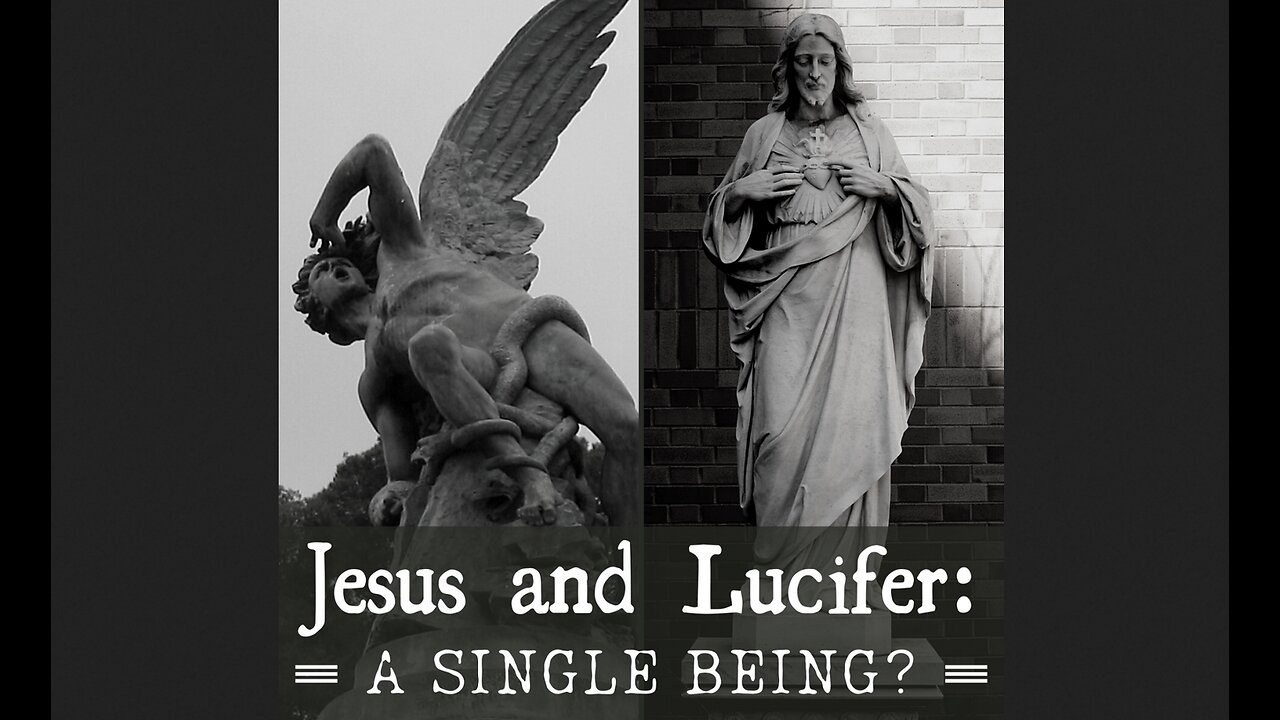Premium Only Content

Proof Jesus is labeled as Lucifer in the Bible (2024)
Mirrored: https://www.youtube.com/watch?v=Lyns0uzVeX0
Are Jesus & Lucifer One and the Same? The theory suggests that the figure traditionally known as Jesus Christ, revered by Christians as the Son of God and the Savior of humanity, is in fact synonymous with Lucifer, the fallen angel and embodiment of evil in Christian theology. This theory challenges conventional beliefs about the nature of Jesus, the origins of Christianity, and the cosmic struggle between good and evil.
Origins and Interpretations
The notion that Jesus and Lucifer are one and the same stems from various interpretations of religious texts, esoteric traditions, and alternative religious movements. Proponents of this theory often draw upon symbolic interpretations of biblical passages, ancient mythologies, and occult teachings to support their claims.
One interpretation suggests that Lucifer, whose name means "light-bringer" or "morning star," embodies the primordial aspect of enlightenment and knowledge. In this view, Lucifer represents the divine spark within humanity, the quest for spiritual liberation, and the pursuit of individual autonomy and self-realization.
According to proponents of the theory, Jesus embodies similar attributes of enlightenment, wisdom, and divine illumination. They argue that the figure of Jesus challenges conventional notions of divine authority and religious orthodoxy, advocating for radical love, compassion, and social justice.
The Greatest Trick
The theory proposing that Jesus is Lucifer posits that the greatest trick the devil could pull is to deceive humanity into worshiping him as a divine savior. It suggests that the traditional portrayal of Jesus as a benevolent and compassionate figure serves as a guise for Lucifer's ultimate deception.
From this perspective, the story of Jesus' life, death, and resurrection becomes a narrative of cosmic subterfuge, wherein Lucifer masquerades as a divine redeemer to lead humanity astray. The miracles attributed to Jesus, his teachings of love and forgiveness, and his sacrificial death on the cross are reinterpreted as manifestations of Lucifer's cunning plan to deceive and manipulate.
The theory underscores the idea that true enlightenment and spiritual liberation cannot be found through external authority or religious dogma, but through inner awakening and self-realization. It challenges believers to question established doctrines and hierarchical structures, urging them to seek truth and enlightenment beyond traditional religious boundaries.
Controversy and Criticism
The theory claiming Jesus is Lucifer has sparked intense debate and controversy within religious and theological circles. Critics argue that it distorts and misinterprets fundamental tenets of Christian faith, trivializing the significance of Jesus' life, ministry, and sacrificial death.
Many Christians reject the notion that Jesus and Lucifer are synonymous, affirming the traditional understanding of Jesus as the Son of God and the embodiment of divine love and redemption. They view the theory as a heretical and blasphemous interpretation that undermines the core beliefs of Christianity.
Additionally, scholars and theologians point out inconsistencies and lack of evidence supporting the theory, highlighting the symbolic and metaphorical nature of biblical narratives and the complex theological concepts they convey.
Conclusion
The theory claiming Jesus is Lucifer represents a provocative reinterpretation of religious symbolism and mythology, challenging conventional beliefs about the nature of divinity, enlightenment, and cosmic truth. While it offers a radical perspective on the figure of Jesus and the origins of Christianity, it remains a highly contentious and polarizing theory within religious discourse.
Ultimately, the debate surrounding this theory underscores the enduring power of religious symbolism and the complexities of interpreting sacred texts and traditions. It prompts individuals to explore the depths of their faith, confront theological paradoxes, and wrestle with questions of ultimate truth and meaning in the human experience.
-
 LIVE
LIVE
BrookieMonster
2 hours ago $2.15 earnedChristmas Stream: Marvel Rivals with CallmeSeags 🎄
1,923 watching -
 LIVE
LIVE
TheSaf3Hav3n
3 days ago| RUMBLES FIRST SUBATHON IS HERE!!! | DAY 4 |
1,814 watching -
 3:14:33
3:14:33
Joe Donuts Gaming
4 hours ago🟢 Live : Christmas is Here!! | Fortnite, Caroling, Light Tours and Donos !!
17K7 -
 LIVE
LIVE
CLUJ
4 hours agoCHRISTMAS EVENING HYPE!! LETS HAVE FUN GAMING!!
937 watching -
![I AM FINALLY BACK :: PUBG: BATTLEGROUNDS :: RUMBLE NOW HAS GIFTED SUBS!!! [Merry Christmas] {18+}](https://1a-1791.com/video/fwe1/22/s8/1/e/f/C/6/efC6v.0kob-small-I-AM-FINALLY-BACK-PUBG-BATT.jpg) LIVE
LIVE
a12cat34dog
5 hours agoI AM FINALLY BACK :: PUBG: BATTLEGROUNDS :: RUMBLE NOW HAS GIFTED SUBS!!! [Merry Christmas] {18+}
140 watching -
 3:55:42
3:55:42
STARM1X16
5 hours agoMerry Christmas Fortnite
22.7K3 -
 2:45:33
2:45:33
Sgtfinesse
5 hours agoMerry Christmas Night
30.5K12 -
 LIVE
LIVE
tacetmort3m
21 hours ago🔴 LIVE - (MERRY CHRISTMAS) TIME TO SPREAD DEMOCRACY - HELLDIVERS 2 OMENS OF TYRANNY
80 watching -
 12:42
12:42
Cooking with Gruel
20 hours agoBrown Butter Trifle with Salted Caramel and Cinnamon Apple
10.1K3 -
 2:46
2:46
BIG NEM
8 hours agoDiscovering RAKIJA: The Holy Liquer of the Balkans
8.05K2